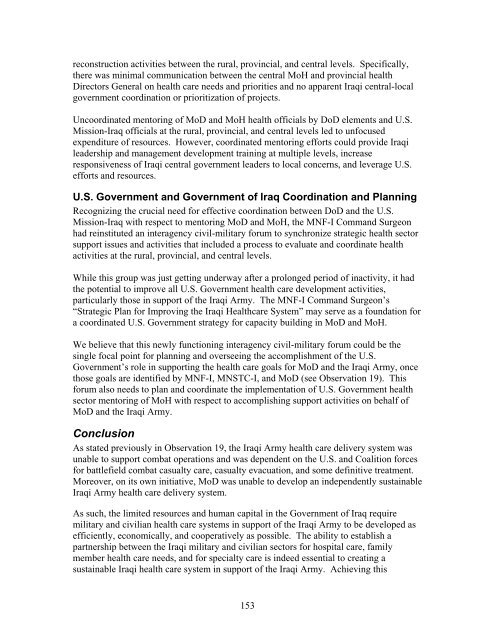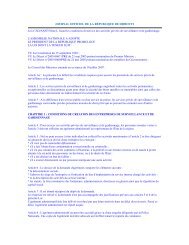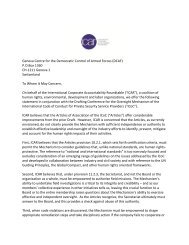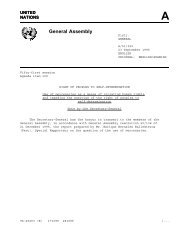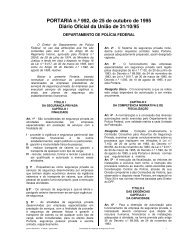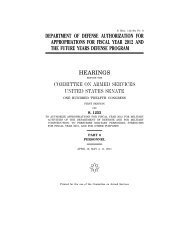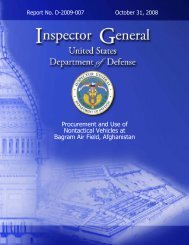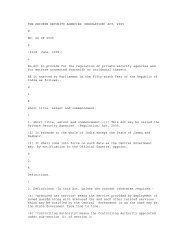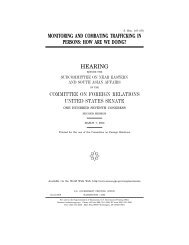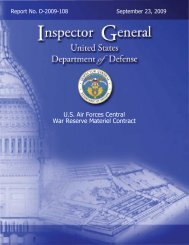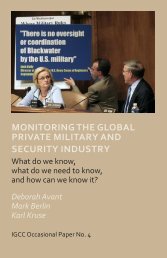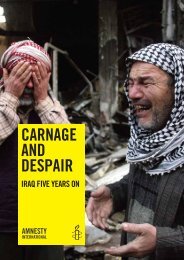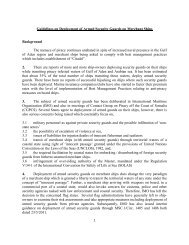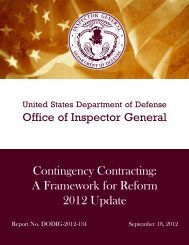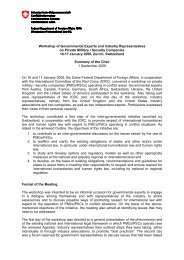Security Assistance; and Logistics - Federation of American Scientists
Security Assistance; and Logistics - Federation of American Scientists
Security Assistance; and Logistics - Federation of American Scientists
You also want an ePaper? Increase the reach of your titles
YUMPU automatically turns print PDFs into web optimized ePapers that Google loves.
econstruction activities between the rural, provincial, <strong>and</strong> central levels. Specifically,there was minimal communication between the central MoH <strong>and</strong> provincial healthDirectors General on health care needs <strong>and</strong> priorities <strong>and</strong> no apparent Iraqi central-localgovernment coordination or prioritization <strong>of</strong> projects.Uncoordinated mentoring <strong>of</strong> MoD <strong>and</strong> MoH health <strong>of</strong>ficials by DoD elements <strong>and</strong> U.S.Mission-Iraq <strong>of</strong>ficials at the rural, provincial, <strong>and</strong> central levels led to unfocusedexpenditure <strong>of</strong> resources. However, coordinated mentoring efforts could provide Iraqileadership <strong>and</strong> management development training at multiple levels, increaseresponsiveness <strong>of</strong> Iraqi central government leaders to local concerns, <strong>and</strong> leverage U.S.efforts <strong>and</strong> resources.U.S. Government <strong>and</strong> Government <strong>of</strong> Iraq Coordination <strong>and</strong> PlanningRecognizing the crucial need for effective coordination between DoD <strong>and</strong> the U.S.Mission-Iraq with respect to mentoring MoD <strong>and</strong> MoH, the MNF-I Comm<strong>and</strong> Surgeonhad reinstituted an interagency civil-military forum to synchronize strategic health sectorsupport issues <strong>and</strong> activities that included a process to evaluate <strong>and</strong> coordinate healthactivities at the rural, provincial, <strong>and</strong> central levels.While this group was just getting underway after a prolonged period <strong>of</strong> inactivity, it hadthe potential to improve all U.S. Government health care development activities,particularly those in support <strong>of</strong> the Iraqi Army. The MNF-I Comm<strong>and</strong> Surgeon’s“Strategic Plan for Improving the Iraqi Healthcare System” may serve as a foundation fora coordinated U.S. Government strategy for capacity building in MoD <strong>and</strong> MoH.We believe that this newly functioning interagency civil-military forum could be thesingle focal point for planning <strong>and</strong> overseeing the accomplishment <strong>of</strong> the U.S.Government’s role in supporting the health care goals for MoD <strong>and</strong> the Iraqi Army, oncethose goals are identified by MNF-I, MNSTC-I, <strong>and</strong> MoD (see Observation 19). Thisforum also needs to plan <strong>and</strong> coordinate the implementation <strong>of</strong> U.S. Government healthsector mentoring <strong>of</strong> MoH with respect to accomplishing support activities on behalf <strong>of</strong>MoD <strong>and</strong> the Iraqi Army.ConclusionAs stated previously in Observation 19, the Iraqi Army health care delivery system wasunable to support combat operations <strong>and</strong> was dependent on the U.S. <strong>and</strong> Coalition forcesfor battlefield combat casualty care, casualty evacuation, <strong>and</strong> some definitive treatment.Moreover, on its own initiative, MoD was unable to develop an independently sustainableIraqi Army health care delivery system.As such, the limited resources <strong>and</strong> human capital in the Government <strong>of</strong> Iraq requiremilitary <strong>and</strong> civilian health care systems in support <strong>of</strong> the Iraqi Army to be developed asefficiently, economically, <strong>and</strong> cooperatively as possible. The ability to establish apartnership between the Iraqi military <strong>and</strong> civilian sectors for hospital care, familymember health care needs, <strong>and</strong> for specialty care is indeed essential to creating asustainable Iraqi health care system in support <strong>of</strong> the Iraqi Army. Achieving this153


